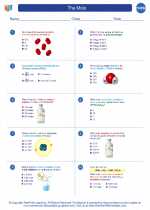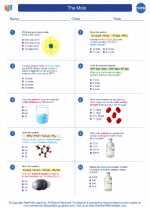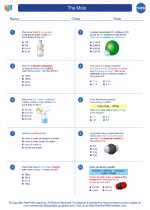Titanium
Titanium is a chemical element with the symbol Ti and atomic number 22. It is a transition metal known for its high strength, low density, and resistance to corrosion. Titanium is commonly used in various applications, including aerospace, medical implants, and sporting equipment.
Physical and Chemical Properties
- Atomic Number: 22
- Atomic Mass: 47.867
- Melting Point: 1,668°C
- Boiling Point: 3,287°C
- Density: 4.506 g/cm3
- Phase at Room Temperature: Solid
- Electron Configuration: [Ar] 3d2 4s2
Uses of Titanium
Titanium is widely used in various industries due to its desirable properties. Some common uses include:
- Aerospace: Titanium is used in aircraft components, including airframes, engines, and landing gear, due to its high strength-to-weight ratio and corrosion resistance.
- Medical: Titanium is used in medical implants, such as joint replacements and dental implants, as it is biocompatible and resistant to bodily fluids.
- Sports and Recreation: Titanium is utilized in sporting equipment, such as bicycle frames, golf clubs, and tennis rackets, for its strength and durability.
- Industrial Applications: Titanium is used in various industrial processes, including chemical processing, desalination, and power generation, due to its corrosion resistance.
Production of Titanium
Titanium is commonly produced through the Kroll process, which involves the reduction of titanium tetrachloride (TiCl4) with magnesium. This process results in the formation of titanium sponge, which can be further processed into various forms, such as ingots, powders, and sheets.
Study Guide
To understand titanium comprehensively, consider the following study guide:
- Atomic Structure: Learn about the atomic structure of titanium, including its atomic number, mass, electron configuration, and position in the periodic table.
- Physical Properties: Understand the physical properties of titanium, such as its melting point, boiling point, and density, and how these properties contribute to its usefulness in various applications.
- Chemical Properties: Explore the chemical properties of titanium, including its reactivity, corrosion resistance, and ability to form compounds.
- Uses: Investigate the diverse uses of titanium in industries such as aerospace, medical, sports, and industrial applications, and the specific reasons for its suitability in each of these fields.
- Production: Study the Kroll process and other methods used for the production of titanium, including the raw materials involved and the steps in the production process.
By mastering these aspects of titanium, you will gain a comprehensive understanding of this versatile and valuable element.



